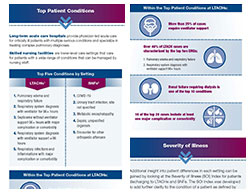
Deciding on the suitable post-acute care (PAC) setting for a affected person leaving the ICU is a key part of enhancing outcomes and decreasing readmissions. This makes understanding the variations between PAC choices important.
Whereas long-term acute care hospitals (LTACHs) and expert nursing amenities (SNFs) are sometimes misunderstood as fulfilling the identical position, they exist to take care of sufferers with completely different admitting circumstances and severities of sickness.
Be taught extra about these distinct affected person populations and learn how to decide when a affected person may have LTACH care.
Prime Affected person Circumstances
Lengthy-term acute care hospitals present physician-led acute take care of critically sick sufferers with a number of severe circumstances and specialise in treating advanced pulmonary diagnoses.
Expert nursing amenities are lower-level care settings that take care of sufferers with a variety of circumstances that may be managed by nursing employees.
Prime 5 Circumstances by Setting
LTACHs1
- Pulmonary edema and respiratory failure
- Respiratory system prognosis with ventilator for 96+ hours
- Septicemia with out ventilator help 96+ hours with main complication or comorbidity
- Respiratory system prognosis with ventilator help ≤96 hours
- Respiratory infections and inflammations with main complication or comorbidity
SNFs2
- COVID-19
- Urinary tract an infection, website not specified
- Metabolic encephalopathy
- Sepsis, unspecified organism
- Encounter for different orthopedic aftercare
Inside the Prime Affected person Circumstances at LTACHs:
- Greater than 25% of instances require ventilator help
- Over 40% of LTACH instances are characterised by the highest two DRGs:
- Pulmonary edema and respiratory failure
- Respiratory system prognosis with ventilator help 96+ hours
- Renal failure requiring dialysis is without doubt one of the high 10 circumstances
- 16 of the highest 20 instances embrace a minimum of one main complication or comorbidity
Severity of Sickness
Further perception into affected person variations in every setting will be gained by trying on the Severity of Sickness (SOI) Index for sufferers discharging to LTACHs and SNFs. The SOI Index was developed so as to add additional readability to the situation of a affected person as outlined by APR-DRGs.3 This technique assigns a severity stage of 1-4 (“minor” to “excessive”) primarily based on components resembling stage of the principal prognosis, dependency on hospital employees, and extent of non-operating-room life help procedures.
Whereas solely 17% of sufferers discharged to a SNF are these with an “excessive” severity of sickness, these sufferers make up 55% of the inhabitants transitioning to an LTACH.4
This implies that even the place circumstances handled could overlap between settings, LTACHs have distinctive experience in addressing instances of higher severity.
How Kindred Hospitals Can Assist
Acute care suppliers want companions who can provide physician-directed care that medically advanced sufferers require.
For over 30 years, Kindred Hospitals have offered targeted take care of chronically, critically sick sufferers. With disease-specific certification from The Joint Fee in Respiratory Failure, Kindred focuses on treating sufferers with advanced pulmonary circumstances. Moreover, the Transfer Early program helps sufferers begin rehabilitation as quickly as potential, even whereas on the ventilator.
If in case you have a medically advanced affected person in want of acute care after a hospital keep, name a Kindred Scientific Liaison for a affected person evaluation. Our Scientific Liaison staff will aid you decide whether or not an LTACH keep is suitable in your affected person. In case you are uncertain of who your Kindred consultant is, please be at liberty to contact us through recoveratkindred.com and communicate with a Registered Nurse who can help.
References
- https://www.medpac.gov/wp-content/uploads/2022/03/Mar22_MedPAC_ReportToCongress_v3_SEC.pdf
- https://www.definitivehc.com/sources/healthcare-insights/top-snf-diagnoses
- https://www.ncbi.nlm.nih.gov/pmc/articles/PMC4195109/
- https://www.aha.org/system/recordsdata/media/file/2019/04/fact-sheet-ltch-0319.pdf
January 18, 2023